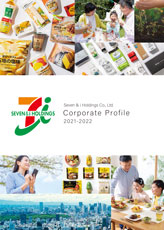- Top
- Sustainability
- Seven & i Group Material Issues
- Material Issues 2
- Food Safety and Reliability
- Sustainability
- Statement
- Message from the Representative Director & Executive Chair (Kaicho)
- Basic Policies of Sustainability Initiatives
- Sustainability Management
- Stakeholder Engagement
- Business Partners
- Seven & i Group Material Issues
- Compliance
- Information Security and Personal Information Protection
- Human Rights Initiatives
- Human Capital Initiatives
- Responses to Climate Change (TCFD) and Nature (TNFD)
- Response Based on the Taskforce on Climate-related Financial Disclosures (TCFD)
- Taskforce on Nature-related Financial Disclosures (TNFD)
- Social Contribution Activities
- Disaster Reconstruction Support
- Disaster Assistance
- Overseas Initiatives
- Sustainability Data Book
- External Recognition and Awards
- SASB/GRI Index
- Index for Researchers
- Keyword search
- Editorial Policy
- Social
- Environment
Food Safety and Reliability
Seven & i Group is working on a variety of measures to emphasize safety and reliability at all stages from raw materials procurement through to sales.
Centralized Management of Production Records
Seven-Eleven Japan manages various daily food product items, which includes rice and delicatessen items. To accurately identify which factories produce them and what materials are used in which areas, Seven-Eleven Japan manages information from all its factories that make daily items by using a database system and links to the POS (point-of-sale) data at its stores to precisely manage the production history of its products, from the production region of the materials used to the stores where the products are sold. This allows us to immediately respond to any problems that may occur with raw materials. It also checks for the presence of allergic substances and additives in its products to ensure that they are sold with the utmost care.
In addition, Seven-Eleven Japan is also able to precisely track the volume of food materials, packaging, and containers used at every factory, which helps it reduce waste by limiting excess production, for instance. Moreover, the company voluntarily conducts DNA testing on rice to prevent the admixture of other varieties as well as testing for radioactive substances.
Seven-Eleven Japan’s Raw Material Production Record Management Framework
![Check history from raw ingredients: [Management data for raw ingredients] Data on the country of origin of each raw ingredient,manufacture and additives. Check production history from sales area: [Logistics management data] Data on raw ingredients, amount used, and usage period for each region Check production history from products: [Recipe master (menu recipe management data)] Data on raw ingredients used in products.](/library/dbps_data/_template_/_res/en/csr/201610/images/theme/theme2/traceability_2018_1.jpg)
Introduction of Cold Chains
Various leafy vegetables are used in 7-Eleven’s original daily foods (rice balls, sandwiches, stuffed bread, salads, delicatessen items, noodles, and so on). We began introducing cold chains (low-temperature distribution networks) in 2005 for low temperature transportation and processing in order to maintain high levels of freshness of produce from harvesting in the field to delivery to stores. Harvested vegetables are consistently maintained at low temperature in delivery vehicles, at sorting centers and processing factories, and until placement on store shelves. In addition, the active use of domestic produce in regions close to where it was harvested reduces energy use in transportation.
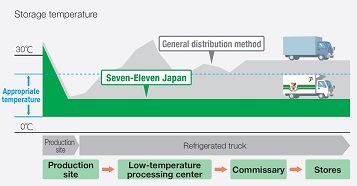
Cold chains (low-temperature logistics networks)
Providing Reliable Products
Fresh Foods with Traceability (Traceable Fresh Foods with Producers' Faces)
Ito-Yokado sells products under its private brand Fresh Foods with Traceability, where it achieves an accurate understanding of production sites, production methods, and distribution channels and communicate these to customers. For these products, its procurement officers check with producers at the production sites to ensure that they are using appropriate cultivation and stock-raising management. Before the products are sold, various tests are conducted, including agricultural chemical residue tests, as well as soil, feed, and water quality tests, and third-party confirmation is obtained. Products are also inspected for radioactive substances. As of June 1, 2024, the Fresh Foods with Traceability brand offers a selection of 80 items of vegetables and fruits, 30 items of fresh meat, 11 items of fresh fish, and 6 items of processed foods, totaling 127 items.
Producer Information Disclosure Methods (Example from Ito-Yokado)
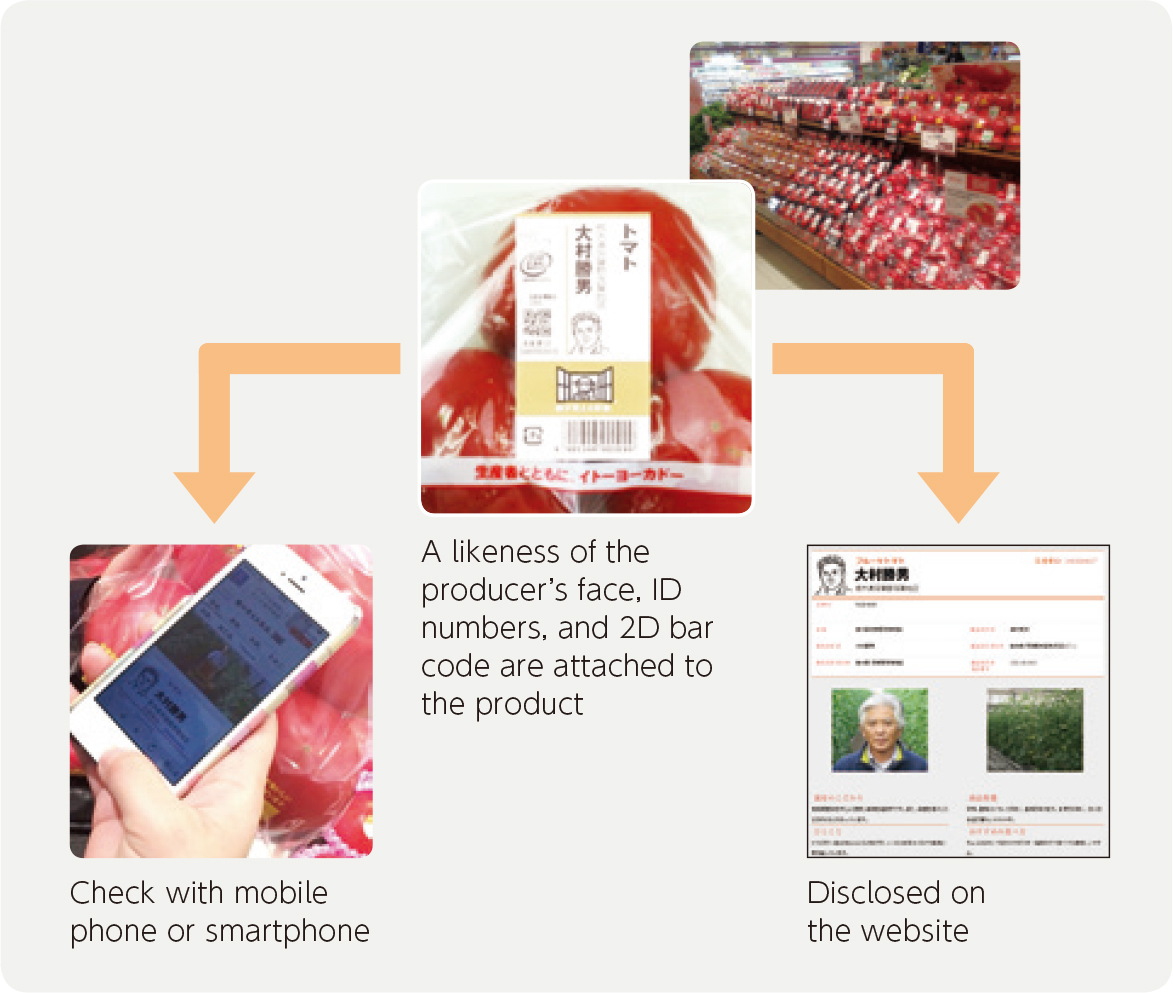
Products with Visible Production Areas
York-Benimaru has established a section called "The Secrets of Deliciousness, Safety, and Reliability" on its website, providing information on the production site, characteristics, production process, producers, and other aspects of the fresh food that the company has carefully selected.
Approach toward the Use of Food Additives
Seven-Eleven Japan aims for fresh, homemade taste for fresh foods such as boxed lunches, and when using food additives, uses the minimum amount and types necessary. Further, we have set voluntary standards for food additives and make every effort to minimize the use of food additives that are of deep concern to our customers. In addition, with regard to labeling on use of additives, we conform to the Consumer Affairs Agency’s “additive free and not-used guidelines” and promote labeling that does not mislead customers.
Reducing Trans-Fatty Acids
It is said that excessive trans-fatty acids increase bad cholesterol in the blood and reduce good cholesterol, heightening the risk of coronary heart disease among other things. In Japan, where intake is low compared to other countries such as Europe and the United States, there is currently no obligation to display trans-fatty acids and no upper limits have been set. Seven-Eleven, however, has been voluntarily making improvements since 2005 to reduce the total amount of trans-fatty acids. In addition, from 2007 we have improved frying oil in order to reduce trans-fatty acids produced in the process of processing fats and oils.

Reduction of Trans Fatty Acids
(Example) Amount per 100 g of Honokana Amami Strawberry Jam Margarine
| FY2005 | FY2007 | FY2012 | FY2019 | FY2022 |
|---|---|---|---|---|
| 1.86g | 0.18g | 0.15g | 0.11g | 0.09g |
Labeling of Food Allergy Information
Seven & i Group, in addition to displaying information about seven specified ingredients (egg, milk, wheat, shrimp, crab, buckwheat, and peanuts) that are required to be labeled under the Food Labeling Law, also recommends displaying information about 21 equivalent items※ so that people with food allergies can choose products with confidence.
Further, due to the Consumer Affairs Agency adding almonds to the “equivalent items” category in September 2019 in light of the increase in the number of people with allergies caused by almonds, Seven-Eleven Japan and Ito-Yokado have been proactively displaying information about almonds as well.
- Items recommended for the “equivalent items” category: abalone, squid, salmon roe, oranges, cashew nuts, kiwifruit, beef, walnuts, sesame, salmon, mackerel, soybean, chicken, banana, pork, matsutake mushrooms, peaches, yam, apples, gelatin, and almonds
Display on all Fresh Foods
Seven-Eleven Japan displays specified ingredients and equivalent items on all fresh foods, including boxed lunches, rice balls, sandwiches, delicatessen items, noodles, bread, and pastries. Additionally, for in-store cooked products (hot snacks, oden, Chinese steamed buns), the use of specified ingredients is displayed on in-store POP, and information on specified ingredients and equivalent items is disclosed on the website.
Display on Products Cooked In-store
At Ito-Yokado, in-store cooked sushi, delicatessen items, etc. are labeled with "specific raw materials" and "equivalent items (excluding almonds)." The food products in the container have allergy information on their labels. For the products sold separately without packaging, a list of allergens contained in each product is posted at the store.
Display on menu book and terminal tablet
Ever since the menu revision in September 2018, Denny's of Seven & i Food Systems has printed information about the use of allergens (specified ingredients and equivalent items) to all menus for all time zones. In addition, a list of allergy information is available on the website, and customers can also search the menu name by allergen only in Denny's in-store menu.
Sales of Products with Food Allergy Considerations
Seven & i Group offers a low-allergen menu to make meals delicious and enjoyable, regardless of food allergies or not.
Sales of "Low-Allergen Menu and Low-Allergen Cake”
At the Denny’s restaurant chain managed by Seven & i Food Systems, there is a low-allergen menu and low-allergen cake for children that do not include any of the seven specified allergens (eggs, milk, wheat, buckwheat, peanuts, shrimp, and crab), created out of consideration for children who have food allergies. When the meals are prepared at the restaurants, employees cook and arrange the food in an area separate from the regular cooking line, and the tableware is individually washed and stored to prevent secondary contamination by allergens.
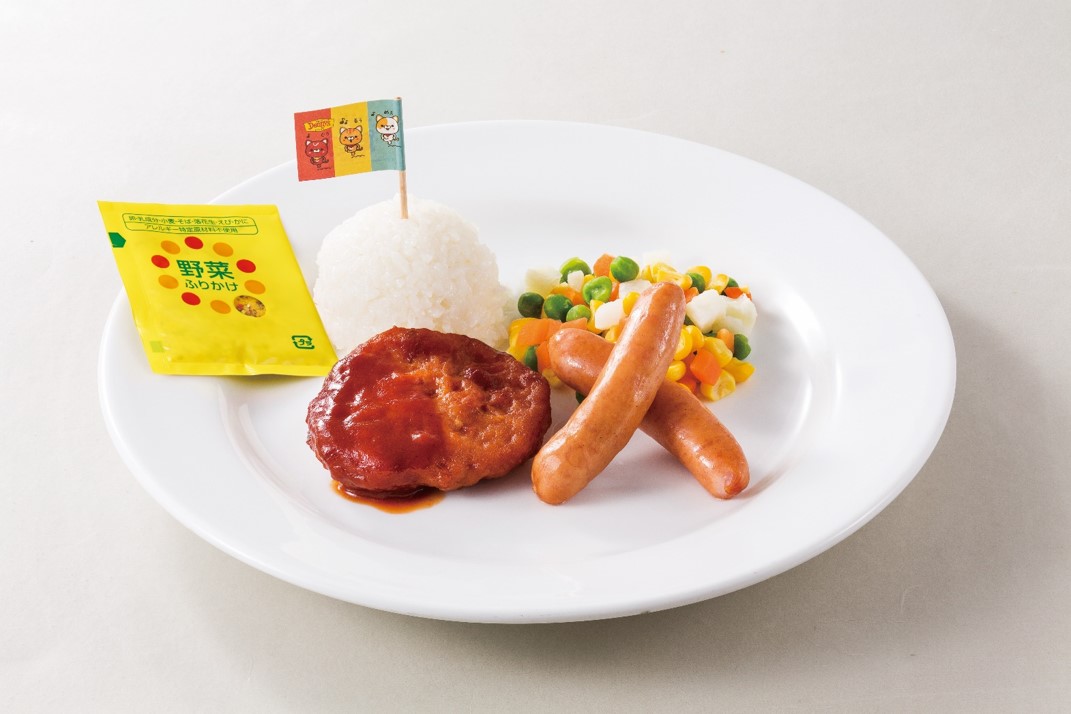
Low-allergen menu
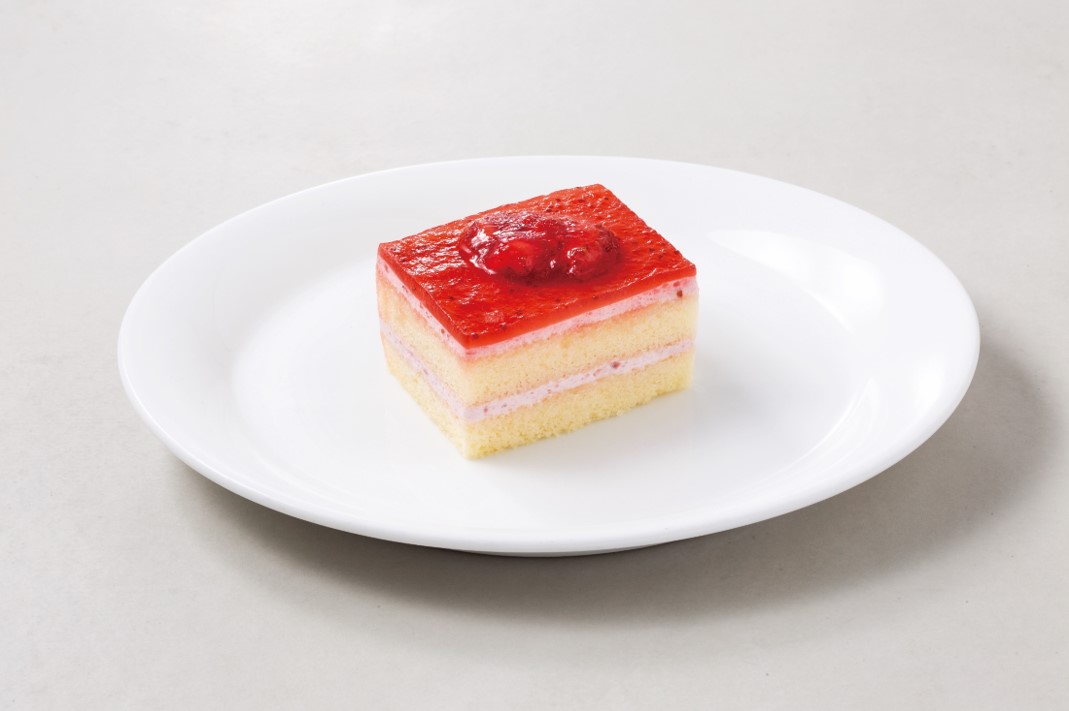
Low-allergen cake
Conducting Food Allergy Workshops
As part of its initiatives to understand food allergies, Seven-Eleven Japan has been co-hosting workshops since 2021 with the Atopicco Network for Children of the Earth, an authorized NPO. The workshops targeted people in their 10s and 20s with food allergies, and their guardians. At discussions held in February 2024, participants shared their experiences of accidental ingestion, talked about how they chose actual products, and provided other information, thus deepening mutual understanding. Seven-Eleven Japan is committed to continued efforts to make display of allergens more accessible by referring to the opinions from the workshops.
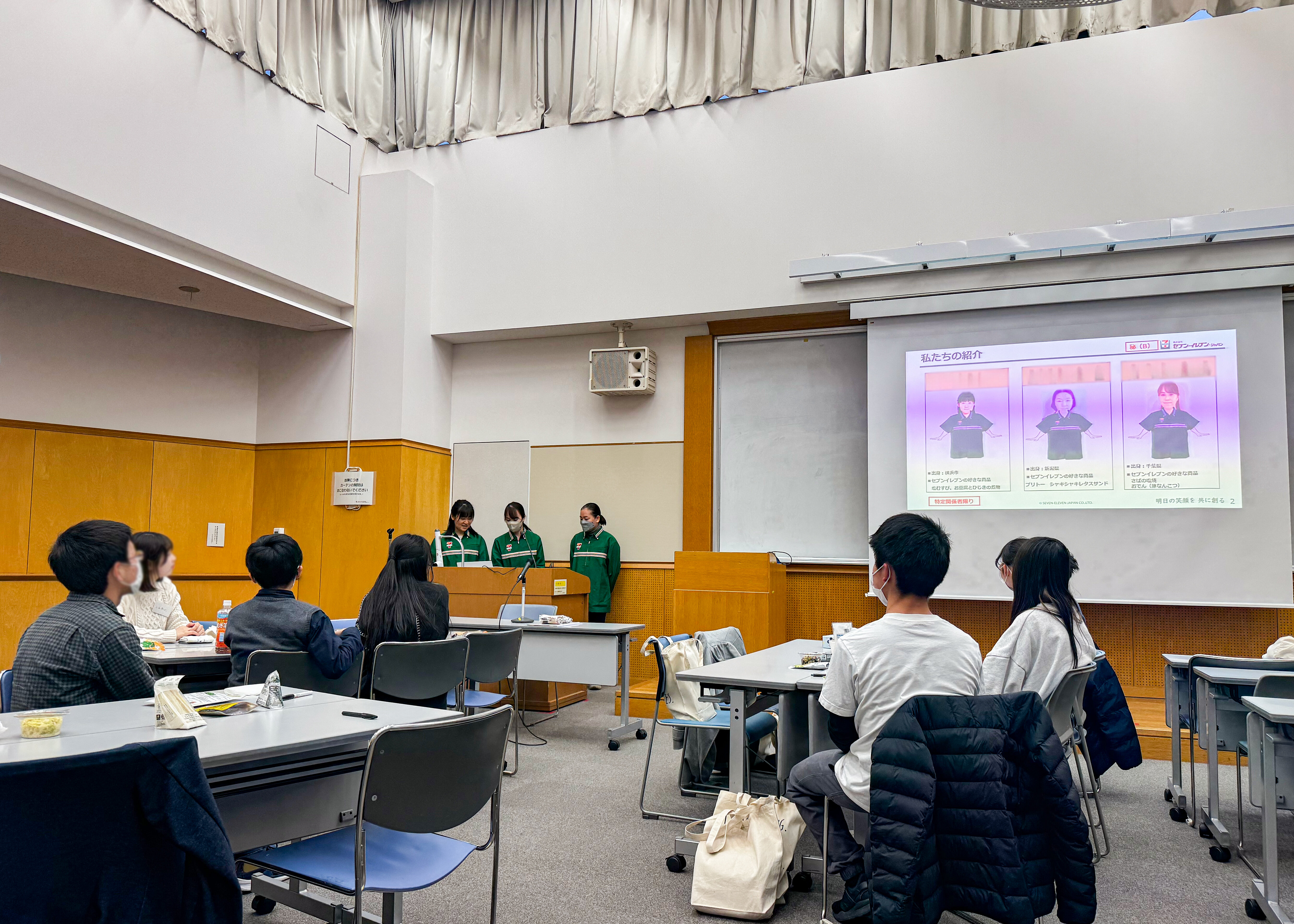
Workshop on food allergies 1
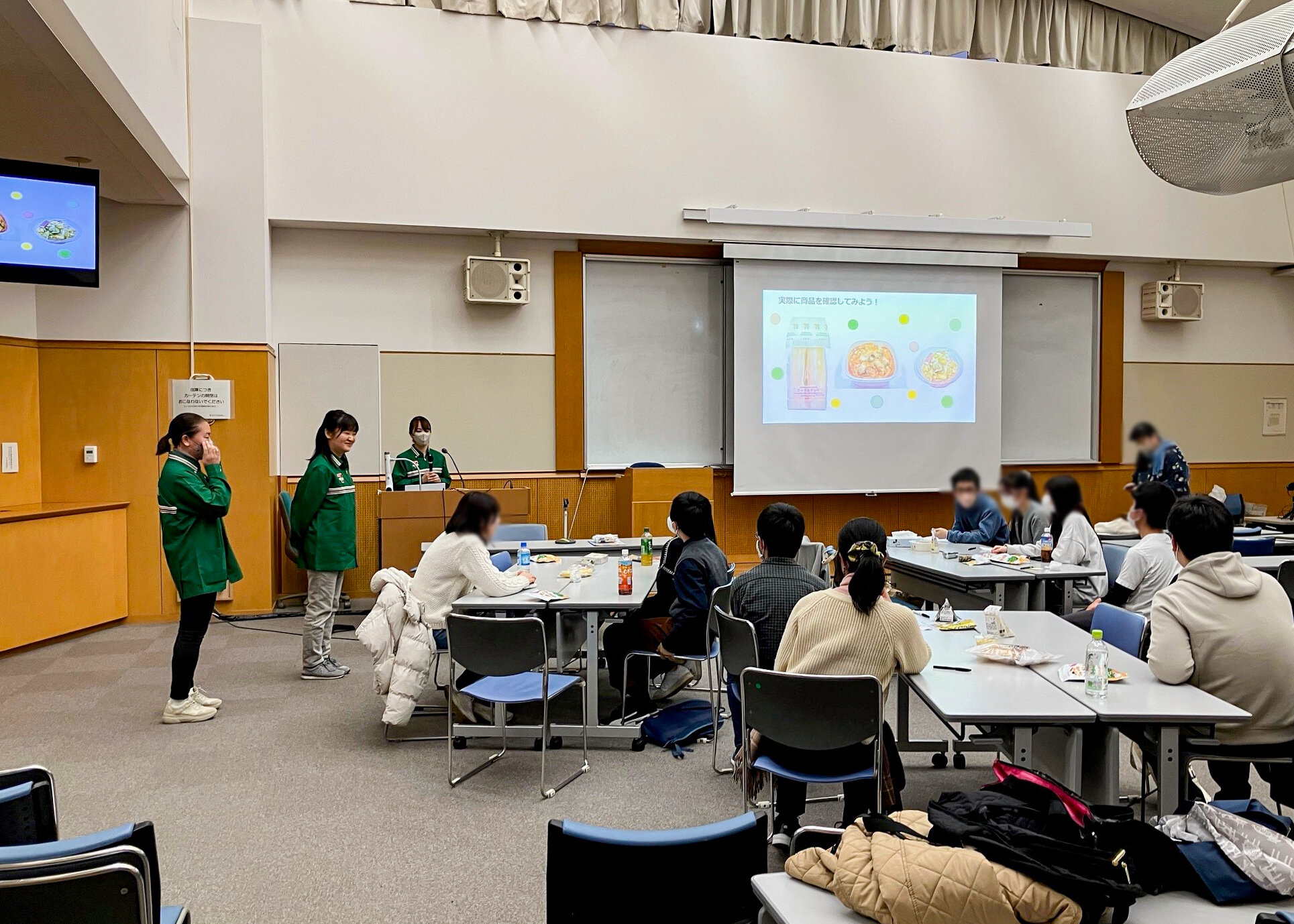
Workshop on food allergies 2
Regarding Handling of Genetically Modified Foodstuff
Seven & i Goup labels genetically modified foodstuffs in accordance with relevant domestic regulations. In addition, genetically modified ingredients are not used for the main ingredients—for which labeling is obligatory—of products under the Group’s private brand Seven Premium (excluding certain products such as soy sauce and oil which use genetically modified potatoes, corn, soy beans, and other products which are permitted to be imported by the Japanese government).
Inspection for Radioactive Substances
In response to an increase in inquiries about radioactive materials since the Great East Japan Earthquake, Seven & i Group voluntarily conducts inspections to complement the monitoring conducted by the government, and we have posted details on our website. Inspections for radioactive substances are conducted for Ito-Yokado’s Traceable Foods with Producers' Faces and the results are published on its website.
Further, York-Benimaru, has also been posting the results of the inspection of radioactive materials conducted by its business partners and government agencies on its website.

